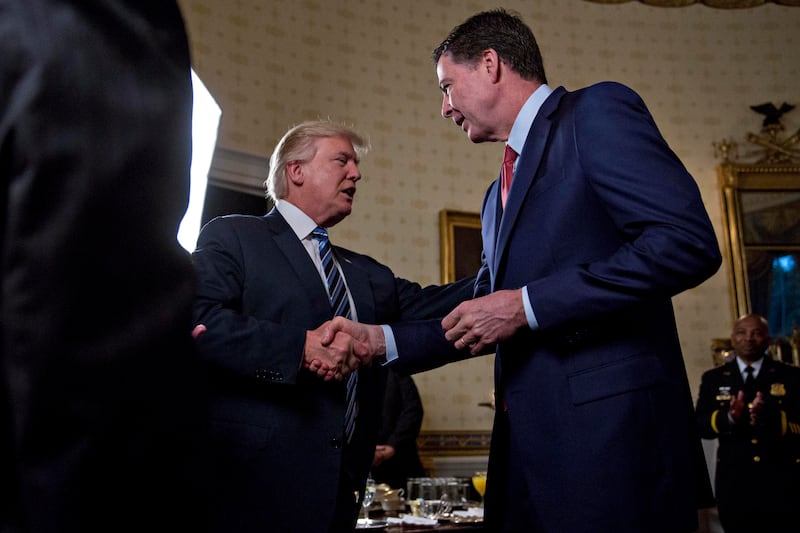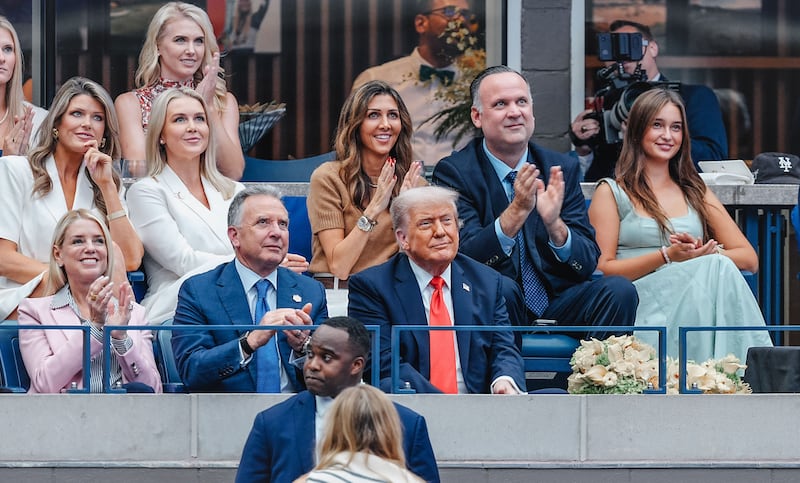The indictment of former FBI Director James Comey finally gives President Donald Trump a criminal case against one of his perceived enemies.
Trump has long blamed Comey for the investigation into Russian interference in the 2016 election. But the price of bringing such an overtly politicized case, with what appears to be extremely weak evidence, will be a steep one for America.
Comey is charged with one count of lying to Congress and one count of obstruction of a Congressional proceeding. These two counts make up an indictment so thin on evidence that any responsible prosecutor, myself included, would not have brought it.
In fact, that seems to be exactly what has already happened: Erik S. Siebert, the U.S. Attorney who led the investigation into Comey, reportedly concluded there was insufficient evidence to charge him. Career prosecutors also put together a memo outlining the lack of evidence.

These conclusions did not sit well with the President of the United States. He fired Siebert for refusing to bring criminal charges. (Siebert apparently also found insufficient evidence to bring charges against New York Attorney General Letitia James, another person on Trump’s s–t list.)
In order to fully cleanse the office leadership, Siebert’s top deputy was also demoted and eventually fired.
Siebert’s replacement? Trump’s former personal attorney Lindsey Halligan—someone with zero criminal law experience, but who placed third runner-up in the Miss Colorado USA competition in 2009.
Halligan’s previous legal chops consist primarily of insurance law; her federal government experience includes working as a White House aide with the assignment to “remove improper ideology” from places like the National Zoo.
In her new role, Halligan worked quickly—she had to. To nail Comey, prosecutors were running up against a statute of limitations period due to expire on Sept. 30. But haste makes waste, and the case brought against Comey appears riddled with serious flaws.
To start with, Halligan appears to have presented the case herself to a grand jury, and was also the only prosecutor in court to present the indictment to a judge. In both contexts, this is unusual.

The U.S. Attorney who is supervising an entire office—in Halligan’s case, one which includes divisions in Alexandria, Richmond, Norfolk and Newport News with over 300 prosecutors, civil litigators and other staff—typically does not have time to personally bring cases to court.
The grand jurors convened to hear her case subsequently refused to indict on a third count of making a false statement to Congress.
A refusal to indict, otherwise known as a “declination,” is also very rare. In my 11 years as a prosecutor, I saw only one. While this indicates the grand jury was not acting as a rubber stamp, it also calls into question the strength of the charges Halligan presented.
Let’s be clear, though: the legal issues go far deeper than Halligan’s shortcomings.
The bare-bones indictment appears to rest entirely upon evidence arising from Comey’s 2020 testimony before the Senate Judiciary Committee. At that time, Republican Senator Ted Cruz tried to confront Comey over what Cruz characterized as a conflict between his testimony (about whether he had authorized leaks about the FBI’s 2016 investigations involving Hillary Clinton’s emails and Trump) and the testimony of former FBI Deputy Director Andrew McCabe. Specifically, Cruz positioned his summary of McCabe’s words as contradicting Comey’s past assertion that he had never personally leaked information to the media nor authorized such a leak:
CRUZ: “Now, what Mr. McCabe is saying and what you testified to this committee cannot both be true. One or the other is false. Who’s telling the truth?”
COMEY: “I can only speak to my testimony. I stand by the testimony you summarized that I gave in May of 2017.”
But Cruz’s “he said/he said” set-up doesn’t hold up. Comey’s testimony that he did not personally leak, or authorize a leak, appears perfectly consistent with McCabe’s. It was McCabe who leaked, and only told Comey about it afterwards.
Reporting now also suggests that the indictment may rest on an alternative set of facts. This scenario involves Comey allegedly lying to Congress about having a close friend leak to the media on his behalf. But it may fare no better since it is not clear at this point whether this friend was employed by the FBI at the time. That matters, because Cruz’s questioning of Comey specifically addressed “someone else at the FBI.”
The confusion engendered here is entirely due to the poor crafting of the indictment. And the potentially differing scenarios arising from the same charging document seem likely to confuse jurors hearing the case.
But a jury may never hear the case to begin with, because Comey’s defense team will almost certainly seek to dismiss it—arguing that Comey is the victim of selective prosecution and/or that Trump and other White House officials have caused irreparable prejudicial pretrial publicity that renders a fair trial impossible.
In normal circumstances, these types of motions rarely win, but this case may be different.
A motion for selective prosecution requires proof of intent on the part of the government to have singled out the defendant for reasons such as their political beliefs. Here, though, Trump’s public pressure on Attorney General Pam Bondi to prosecute not only Comey, but a host of his other enemies, makes that showing pretty easy.
While it’s often possible to resolve the impact of pretrial publicity by moving a case to a jurisdiction where it’s less well-known, that’s not feasible here—because, really, who won’t be familiar with the President of the United States making loud, prejudicial pronouncements about Comey’s guilt?
So Comey, armed with the financial resources and a strong team to fight against weak evidence and a weak prosecutor, may manage to avoid a criminal conviction. Our broader system of justice will not be so fortunate.
Trump has now fully brought the Department of Justice under his personal control—and brags about it in ways that no other president would have dared.
Even President Richard Nixon, well known for keeping lists of rivals and foes to nobble, knew “that he had to at least make justice look blind when he schemed against his enemies,” explained Columbia University historian and former director of the Nixon Presidential library Timothy Naftali in a recent interview with The Washington Post.
Trump possesses no such concerns, and has managed to remove the critical guardrail that helped constrain Nixon: the integrity and conscience of DOJ leadership.
There are, of course, plenty of good line prosecutors with integrity that remain, but it seems clear that the price for showing that integrity is demotion and/or dismissal.
The Saturday Night Massacre during Watergate happened when the attorney general and deputy attorney general both resigned rather than follow Nixon’s corrupt orders. That won’t happen here, since Pam Bondi and Todd Blanche were picked precisely because they will do just the opposite.
The post Opinion: The Fatal Flaws in Trump’s Revenge Case Against James Comey appeared first on The Daily Beast.




